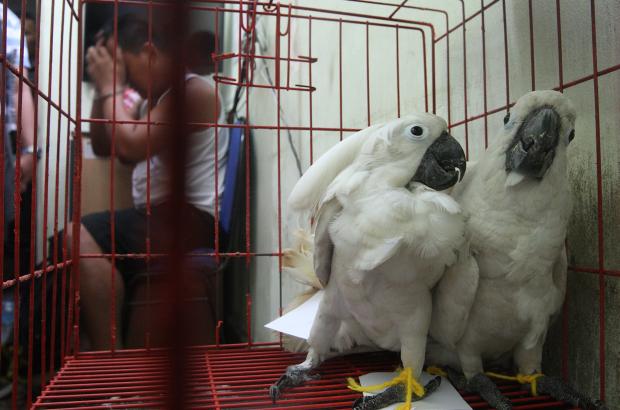Illegal trade of exotic, native birds

Two Umbrella or White Cockatoos are tied in their cage by a vendor (behind, seated with handcuffs ) who tried to sell them for P1,000 each in Cebu. The birds were believed to have been smuggled through Mindanao. (CDN PHOTO/TONEE DESPOJO)
Even exotic and native birds are being smuggled.
Six white Umbrella Cockatoos, which make their home in the forests of Indonesia, were part of a batch of ten wild birds seized in Talisay City where two men tried to sell them yesterday.
The vendors also tried to sell two Philippine Hawk Eagles, which are supposed to be protected under the law because of their dwindling numbers in Mindanao and the Sierra Madre mountains in Luzon.
The seizure was part of a sting operation by government enforcers who were tipped off about the illegal trade of endangered or endemic bird species in Cebu.
“I ordered two owls and two hawks but the suspects showed up with ten birds,” said Loy Anthony Madrigal, head of Cebu province’s environment task force, who posed as a buyer.
After three days of negotiation, the vendors showed up about 10 a.m. at a gasoline station in barangay San Roque, Talisay City to close the deal.
They offered two Philippine Hawk-Eagles for P6,000 each, the cockatoos for P1,000 each, a Crested Serpent Eagle for P2,500 and a young Amethyst Brown Dove.
Only the dove and serpent eagle are not endangered species, said the Department of Environment and Natural Resources (DENR) but possession of wildlife without a permit is still unlawful.
“There is no place for wildlife traffickers in Cebu,” said Madrigal, who recently led seizures of truckloads of banned thresher shark meat and just this week, rare Helmet and Triton seashells on their way to a Cebu plant for export.
Madrigal said the government cant turn a blind eye on the caged bird trade.
“Nowadays, I have to go to the zoo in order to see these kinds of species. We can no longer see them in the wild,” he told reporters.
“If we don’t do anything to save them, future generations won’t have the chance to see the real birds. Our children would just read about them in books. Now is the time to act, and we’re running out of time,” he said.
The birds, loaded in a blue Toyota Revo with plate number WKP-241, were believed to have come from Mindanao.
The arrest was made by a joint team of the Department of Environment and Natural Resources and province.
The white feathered Umbrella Cockatoo is endemic in islands of Indonesia. The apprehension confirmed intelligence reports that wildlife smuggling through “backdoor entry” in the Philippines really exists, said Ariel Rica, chief of the Protected Area and Wildlife Division.
On Monday, the DENR 7 will file a case against Stephen Ng Sy, 34 and Alberto Primor, 27, for possessing and collecting the birds, mostly endangered and endemic of various species, without permits in violation of Section 27 of Republic Act Number 9147 or the Wildlife Resources Conservation and Protection Act.
Both men failed to show legal documents to the team.
The vendors were brought to the Capitol and may be transferred to the Talisay City Police Station later.
The confiscated birds will be turned over to Crocolandia, a wildlife conservation park in Talisay City, for temporary care and custodial safekeeping while the case is being heard, said Rica.
ENDANGERED
The Convention on International Trade in Endangered Species (CITES) of Wild Fauna and Flora and DENR Administrative Order Number 2004-15 listed the Philippine Hawk Eagle or nisaetus philippensis as “vulnerable” to extinction and the Umbrella Cockatoo or White Cockatoo (Cacatua albaas) as “endangered”.
The Philippine Serpent Eagle or spilormis holospilus and Crested Serpent Eagle or spilomis cheela still have stable populations and are listed as of “least concern” in terms of threats to their species, according to the International Union of Conservation of Nature (IUCN) Red List.
The Brown Dove or Zenaida macroura is classified as “other wildlife species”.
An endangered species is one whose whose survival in the wild is unlikely if the causal factors continue operating.
Vulnerable species are those that are under threat from adverse factors and may move to the category of “endangered” species in the near future.
No serious threats face the Amethyst Brown Dove but this bird has the tendency to become threatened due to habitat loss and predators.
CITES is an international agreement between governments to ensure that international trade in specimens of wild animals and plants does not threaten their survival.
DENR 7 Regional Executive Director Isabelo Montejo, in a statement, said the vendors would be charged on Monday.
“They should have an original copy of the certificate of wildlife registration or any permit from us to ensure that what they are buying are legal and are not prohibited or endangered,” he said.
Under RA 9147, collecting, hunting or possessing wildlife, their by-products and derivatives is punishable by law.
Under Section 28, violators face two to four years in prison or a fine of P30,000 to P200,000 or both for exploiting an endangered species.
The penalty is one to two years and/or a fine of P20,000 to P200,000 if a vulnerable species is involved.
For offenses against other wildlife species, the penalty is one to six months and/ or a fine of P5,000 to P20,000.
Related Stories:
World Migratory Birds Day: Olango Island vital stop of migratory birds
Seized Zambo shells may be returned to sea
Disclaimer: The comments uploaded on this site do not necessarily represent or reflect the views of management and owner of Cebudailynews. We reserve the right to exclude comments that we deem to be inconsistent with our editorial standards.
